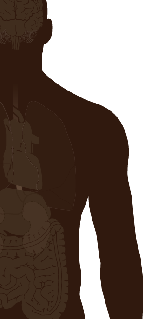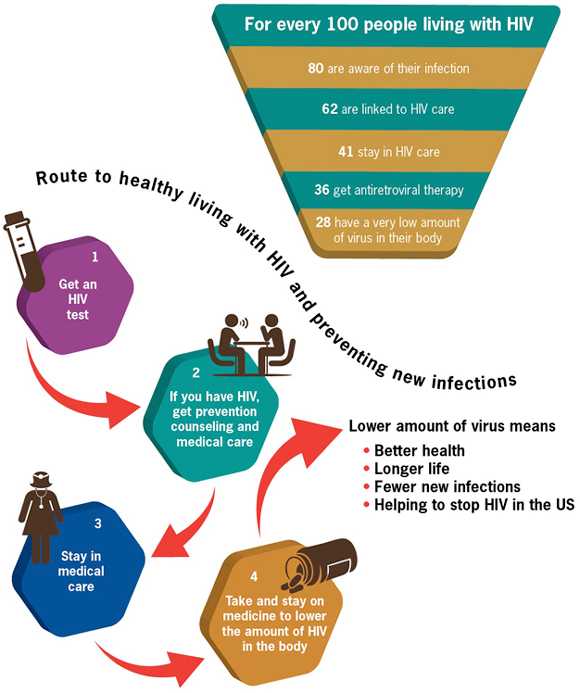New Hope for Stopping HIV
Testing and Medical Care Save Lives
On This Page
December 2011


 1.2M
1.2M
About 1.2 million people in the US are living with HIV.
 1 in 5
1 in 5
Nearly 1 in 5 people with HIV don't know they are infected, don't get HIV medical care, and can pass the virus on to others without knowing it.
 1 in 4
1 in 4
Only 28% of people with HIV are taking HIV medicine regularly and have their virus under control.
Too many people don't know they have HIV (human immunodeficiency virus). About 1.2 million people are living with HIV in the US but about 240,000 don't know they are infected. Each year, about 50,000 people get infected with HIV in the US. Getting an HIV test is the first step to finding out if you have HIV and getting medical care. Without medical care, HIV leads to AIDS (acquired immunodeficiency syndrome) and early death.
There's new hope today for stopping HIV in the US. Medicines (antiretroviral therapy or ART) can lower the level of virus in the body. ART helps people with HIV live longer, healthier lives and also lowers the chances of passing HIV on to others. However, only 28% are getting the care they need to manage the disease and keep the virus under control. To help stop HIV, get tested. If you have HIV, get medical care and work with your health care provider to control the virus and not pass it on to others.
Problem
Many people don't know they have HIV or take all the actions to control it.
Testing: More people need to be tested for HIV.
- 1.2 million people are living with HIV in the US.
- Nearly 1 in 5 people (about 240,000) don't know they are infected.
- Getting an HIV test can lead to getting the medical care needed to stay healthy longer.
- People who don't know they have HIV have a higher risk of serious medical problems and early death.
- People who don't know they have HIV can also pass the virus on to others without knowing it.
- Youth and adults should get tested to learn their HIV status.
- People who are at greater risk for infection (have more than one sex partner, inject drugs, or are men who have sex with other men) should get tested once a year or more often.
Treating: Many people with HIV do not receive the medical care they need.
- Lowering the amount of virus in the body can keep a person with HIV healthy longer.
- Keeping the virus under control with medicines greatly lowers the chances of passing HIV on to others.
- Only 28% of all people with HIV know they are infected, get regular medical care, take ART and have the HIV virus under control.
- The number of people with HIV who get AIDS has decreased over time because of advances in medical care and ART. Still, more than 16,000 people with AIDS die each year.
- Public health professionals and health care providers should help people with HIV make sure to get regular HIV medical care and take their medicines.
Prevention Counseling: Only 45% of people with HIV getting medical care received prevention counseling from their health care providers in the past year.
- Prevention counseling teaches patients how to stay as healthy as possible and prevent passing HIV on to others. Prevention services include STD testing and treatment services, drug rehab, assistance in notifying partners, housing assistance, financial assistance and other services.
- People with HIV should get prevention counseling and services as a part of regular HIV care.
- People with HIV whose virus is controlled still need prevention counseling and prevention services regularly.
HIV care in the United States
1.2 million people are living with HIV

What Can Be Done
Everyone can
- Lower risky sexual behavior by not having sex, having sex with only one partner who you know is uninfected, or using a condom every time you have anal, vaginal, or oral sex.
- Ask your doctor for an HIV test.
- Get medical care as soon as possible if you have HIV, to stay healthier longer and to keep from passing the virus on to others.
- Get tested if you live in a community where HIV is more common.
- Get tested once a year or more often if you have more than one sex partner, inject drugs or are a man who has sex with other men.
US Government can
- Develop guidelines for health care providers on testing and medical care.
- Educate health care providers and the public about the importance of HIV testing and medical care.
- Fund programs that support effective HIV prevention services and medical care.
- Identify and track differences in medical care, illness and death across different groups of people.
- Help meet the goals of the National HIV/AIDS Strategy, including getting all people with HIV into care.
State and local health departments can
- Fund programs that support effective HIV prevention services and medical care.
- Create programs and policies to test people at risk for HIV early and often.
- Provide information about where people can get an HIV test such as www.hivtest.org.
- Educate people about the benefits of HIV testing, regular care, and treatment.
- Get people who have HIV infection connected to HIV medical care.
- Promote HIV prevention counseling and services as a regular part of care.
- Support community actions to prevent new HIV infections and help people with HIV.
- Help meet the goals of the National HIV/AIDS Strategy, including getting all people with HIV into care.
Health care providers can
- Offer their patients an HIV test as a regular part of medical care.
- Offer their patients STD testing and treatment services.
- Prescribe ART as needed for patients with HIV and make sure the amount of virus is as low as possible.
- Make sure people with HIV continue getting HIV medical care.
- Provide HIV prevention counseling to patients on how to protect their health and avoid passing the virus on to others; refer to other prevention services (for example, partner counseling) as needed.
Science Behind the Issue
Related Pages
- Vital Signs Issue details: HIV Prevention Through Care and Treatment — United States. Morbidity and Mortality Weekly Report (MMWR)
- CDC Feature- Preventing HIV Through Testing, Care and Treatment
- New Hope for Stopping HIV – Testing and Medical Care Save Lives [PODCAST – 1:15 minutes]
- New Hope for Stopping HIV – Testing and Medical Care Save Lives [PSA – 0:60 seconds]
- CDC Radio Vital Signs PSA for World AIDS Day [PODCAST – 0:30 seconds]
- Winnable Battles
- CDC HIV/AIDS
- CDC Global HIV/AIDS
- CDC Vital Signs Report on HIV in the United States
- CDC Basic HIV Information
- CDC Fact Sheets:
On Other Web Sites
- Page last reviewed: November 29, 2011
- Page last updated: November 29, 2011
- Content source:
- National Center for HIV/AIDS, Viral Hepatitis, STD, and TB Prevention, Division of HIV/AIDS Prevention
- Page maintained by: Office of the Associate Director for Communications (OADC)


 ShareCompartir
ShareCompartir